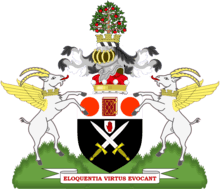Baron Silsoe
Baron Silsoe, of Silsoe in the County of Bedford, is a title in the Peerage of the United Kingdom.[2] It was created on 18 January 1963 for the barrister Sir Malcolm Trustram Eve, 1st Baronet. He had already been created a Baronet, of Silsoe in the County of Bedford, on 18 January 1943.[3] He was succeeded by his son, the second Baron. Known as David Silsoe, he was also a barrister. As of 2017 the titles are held by his son Simon, the third Baron, who succeeded in 2005.
| Baron Silsoe | |
|---|---|
 | |
| Crest | Issuant from a mural coronet Or an apple tree fructed the trunk entwined by a serpent Proper. |
| Blazon | Sable two swords points upwards in saltire Argent pommels and hilts Or. On a chief of the second a closed book Gules garnished of the third between two torteaux. |
| Supporters | On either side a Kashmir goat Argent horned winged and gorged with a mural crown Or. |
| Motto | Eloquentia Virtus Evocant [1] |
Silsoe is a town in Bedfordshire.
Barons Silsoe (1963)
- (Arthur) Malcolm Trustram Eve, 1st Baron Silsoe (1894–1976)
- David Malcolm Trustram Eve, 2nd Baron Silsoe (1930–2005)
- Simon Rupert Trustram Eve, 3rd Baron Silsoe (born 1966)
The heir presumptive is the present holder's uncle, the Hon. Peter Nanton Trustram Eve (born 1930).
The heir presumptive's heir apparent is his son, Richard Malcolm Jannion Trustram Eve (born 1963).
The heir presumptive's heir apparent's heir apparent is his son, Alexander Christopher Peter Trustram Eve (born 1993).
Line of succession



- (1) Hon. Peter Nanton Trustram Eve (born 1930)
- (2) Richard Malcolm Jannion Trustram Eve (born 1963)
- (3) Alexander Christopher Peter Trustram Eve (born 1993)
- (4) James Arthur Richard Trustram Eve (born 1996)
- (5) Nicholas Dominic Peter Trustram Eve (born 1965)
- (2) Richard Malcolm Jannion Trustram Eve (born 1963)
Notes
- Debrett's Peerage & Baronetage. 2000.
- "No. 42898". The London Gazette. 18 January 1963. p. 585.
- "No. 35841". The London Gazette. 1 January 1943. p. 1.
- http://www.thepeerage.com/p57678.htm#i576774
References
- Kidd, Charles, Williamson, David (editors). Debrett's Peerage and Baronetage (1990 edition). New York: St Martin's Press, 1990,
- Leigh Rayment's Peerage Pages